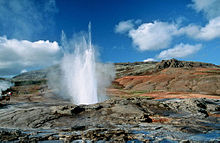geyser
Jump to navigation
Jump to search
English
[edit]
Etymology
[edit]From the name of a particular Icelandic geyser which is mentioned as early as the 1760s in The Annual Register, as “Geyser, a wonderful spring in the valley of Haukadal”.[1] From Geysir (“Gusher”), the Icelandic name of the hot spring in Iceland (see Wikipedia), from the verb geysa (“to gush”), from Old Norse geysa (“to gush”). Doublet of gusher.
Pronunciation
[edit]- (UK) IPA(key): /ˈɡiː.zə/, /ˈɡaɪ.zə/
Audio (Southern England): (file) Audio (Southern England): (file) - (US) IPA(key): /ˈɡaɪ.zɚ/, /ˈɡaɪ.sɚ/
- Rhymes: -aɪzə(ɹ), -iːzə(ɹ)
- Homophones: guiser, geezer

Noun
[edit]geyser (plural geysers)
- (planetology, geology, volcanology) A boiling natural spring which throws forth jets of water, mud, etc., at frequent intervals, driven upwards by the expansive power of steam.
- (by extension) A momentary vertical jet or fountain of fluid driven upwards by a violent force.
- 2021 May 5, Drachinifel, 42:03 from the start, in Battle of Samar - What if TF34 was there?[2], archived from the original on 19 August 2022:
- Sporting a few war wounds from Japanese destroyer gunfire, The Sullivans had already launched one spread of torpedoes at the Japanese destroyers that were now littering the ocean floor, or, occasionally, making their own retreat, but she still had one left, so a five-torpedo spread was duly sent at near-point-blank range into the listing and burning remains of Yamato, and, shortly thereafter, four large geysers of water were the reward.
- (British, archaic) An instantaneous, and often dangerous, hot water heater.
- 1902, William Paton Buchan, Plumbing: A Text-book to the Practice of the Art Or Craft of the Plumber:
- Where a Geyser or hot-water heater is used it is a good and wise precaution to see that the bath-room, &c., when it is used is well ventilated.
- 1998, Gordon S Riess, Confessions of a Corporate Centurion: Tales of International Adventures:
- Water was heated either on the gas stove, or on a wall mounted gas-fired "geyser" heater.
- 2002, Alaine Polcz, One woman in the war: Hungary, 1944-1945:
- It was here I saw a geyser gas water heater in a bathroom for the first time. (I was afraid of it).
- (South Africa, South Asia) A domestic water boiler.
Derived terms
[edit]Translations
[edit]boiling spring
|
archaic: hot water heater — see also hot water heater
|
domestic water boiler
|
Verb
[edit]geyser (third-person singular simple present geysers, present participle geysering, simple past and past participle geysered)
- (transitive, intransitive) To (cause to) rush or burst upward like water from a geyser.
- 1944, Jacland Marmur, Sea Duty: And Other Stories of Naval Action, page 21:
- Four jets of water geysered upward from the sea. Short and wide. He noted it. Ranging salvo. His division was discovered.
References
[edit]- ^ “source EVS Translations”, in (Please provide the book title or journal name)[1], 2014 February 6 (last accessed), archived from the original on 25 January 2014
Anagrams
[edit]French
[edit]Etymology
[edit]Borrowed from Icelandic Geyser, related to the verb geysa (“to gush”).
Pronunciation
[edit]Noun
[edit]geyser m (plural geysers)
Further reading
[edit]- “geyser”, in Trésor de la langue française informatisé [Digitized Treasury of the French Language], 2012.
Indonesian
[edit]Noun
[edit]geyser (plural geyser-geyser, first-person possessive geyserku, second-person possessive geysermu, third-person possessive geysernya)
- (geology, nonstandard) Alternative spelling of geiser (“geyser”)
Categories:
- English terms derived from Icelandic
- English terms derived from Old Norse
- English doublets
- English 2-syllable words
- English terms with IPA pronunciation
- English terms with audio links
- Rhymes:English/aɪzə(ɹ)
- Rhymes:English/aɪzə(ɹ)/2 syllables
- Rhymes:English/iːzə(ɹ)
- Rhymes:English/iːzə(ɹ)/2 syllables
- English terms with homophones
- English lemmas
- English nouns
- English countable nouns
- en:Planetology
- en:Geology
- en:Volcanology
- English terms with quotations
- British English
- English terms with archaic senses
- South African English
- South Asian English
- English verbs
- English transitive verbs
- English intransitive verbs
- French terms borrowed from Icelandic
- French terms derived from Icelandic
- French 2-syllable words
- French terms with IPA pronunciation
- French terms with audio links
- French lemmas
- French nouns
- French countable nouns
- French masculine nouns
- fr:Geology
- Indonesian lemmas
- Indonesian nouns
- id:Geology
- Indonesian nonstandard terms

